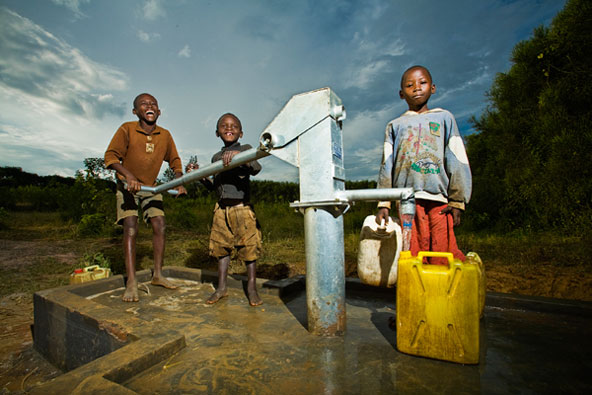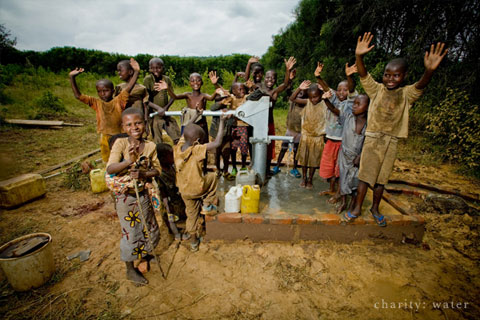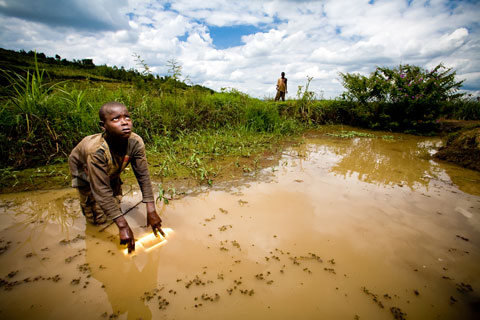 Photographs by charitywater.orgA clean drinking well in Rwanda, financed by donations to Charity Water.
Photographs by charitywater.orgA clean drinking well in Rwanda, financed by donations to Charity Water.
Scott Harrison used to be a New York City club promoter, making a living from selling people $16 drinks and $300 bottles of vodka. Now he is the founder and chief executive of Charity Water, a nonprofit that focuses on the need for clean drinking water around the world.
Mr.Harrison, 36, says the group received early support from people in technology, and for its growth, has relied on methods borrowed from social media, and from the way start-ups operate. Here is an edited version of our conversation.
What is Charity Water?
It’s a nonprofit that brings clean and safe drinking water to people in need around the world.
 Scott Harrison, founder and chief executive of Charity Water.
Scott Harrison, founder and chief executive of Charity Water.
How did you end up starting a nonprofit?
I was dismayed that people my age weren’t donating to charity. Younger people had a long list of reasons why they didn’t want to donate, including that they didn’t trust charities. They didn’t know where their donations were going.
You run the nonprofit like a start-up and not like a charity. How did this happen?
Our early spurt of donations came from people in technology. For example, Michael Birch, who successfully exited Bebo, was our initial bridge to Silicon Valley. Through Michael we started spending more time in Silicon Valley and got to meet people like Dennis Crowley and Jack Dorsey.
Why did people in Silicon Valley want to work with Charity Water, and not, say, The Red Cross?
I think Charity Water felt different to them. We were young, we were tackling an improbably important problem: trying to bring clean water to one billion people. Because we acted like a start-up, people who run start-ups could associate with us.
Do you attribute a lot of Charity Water’s success to the Web?
Yes. Absolutely. Because I came from a nontraditional background, I didn’t really know how fund-raising worked. To me, the most efficient way to raise money was online, so we adopted that as the main vehicle to reach people. Today over 75 percent of our donations for water projects come from the Web.
Has your focus on technology helped you grow?
Over the last four years we’ve grown by 400 percent while charitable giving in American has been going down, on an aggregate, by as much as 10 percent over the past three years.
What else do you differently with the Web?
We are able to tie donation dollars with integrity to the water project they funded. We show people the impact their donations have had. For us that means photographing all the water wells and showing people online where their money went.
Have sites like Twitter and Facebook helped you expand and reach a larger audience?
Absolutely! Social media has played an integral role in our rapid growth and success. We use a very visual language in the way we talk to people about our goals. I like to say that “we show and we don’t tell.” Rather than tell you about a child walking for five hours a day to get drinking water, we’ll show you online.
How else do you use the Web?
With YouTube we created thank you videos for our donors. For example, if a donor baked for us to make money for Charity Water, our staff dressed up as bakers and made a video thanking them. If a donor, like Chris Sacca, biked across America, then our staff dressed up this way.
How did you end up starting Charity Water?
I was a club promoter for almost 10 years in New York. I got people wasted for a living. I sold them expensive drinks in expensive bottles at nightclubs. At 28 years old, after a decade of selfish and decadent living, I realized how miserable I was. I went to live in Liberia in West Africa with a group of humanitarians and surgeons, and I saw extreme poverty for the first time in my life. It ruined me. I spent almost two years as a volunteer there. Then, I came home and started Charity Water.

What have you learned that can help other nonprofits?
Simplicity is key. Be able to tell your story simply. I can’t tell you how many nonprofits I meet and after three minutes talking to them, I still have no idea what they do. Show. Don’t tell. And do it visually. Use the Web to tell people where their money has gone and let them see what it has done.
Has mobile helped you with donations?
No one has figured out mobile giving, yet. We’ve experimented with text campaigns with some degree of success, but we’re really looking for that big idea in mobile and giving.
Start-ups can sometimes be ostentatious with their money. Does it bother you when working with these companies?
I remember when I first came to New York from Africa, my first day back someone bought me a sixteen-dollar cocktail at the Soho House and my paradigm had shifted. Sixteen dollars could have bought a bag of rice, feeding a family for a month in Liberia. I remember feeling angry and self-righteous and indignant, but I knew that it would do no good. Who was I to judge? I look at the wealth and success in Silicon Valley as an opportunity to transform lives around the world without judging people and I want to invite them into our story.
What impact has Charity Water had so far?
In just over five years, Charity Water has raised over $58 million from 250,000 generous donors around the world. We have also funded 4,280 water projects that will provide two million people with clean drinking water in 19 countries.
Start-ups see going public or an acquisition as success. What’s your goal?
We envision a day when every person on earth has clean and safe water to drink.
 Charity Water plans to bring clean drinking water to one billion people around the world.
Charity Water plans to bring clean drinking water to one billion people around the world.
Article source: http://feeds.nytimes.com/click.phdo?i=18ca858cbb3fd3d14b12971d2d3392a2
Speak Your Mind
You must be logged in to post a comment.